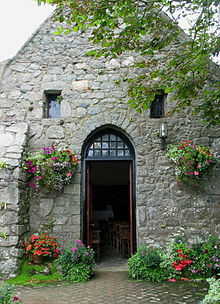St Tugual's Chapel
| St Tugual's Chapel | |
|---|---|
 The entrance to St Tugual's Chapel | |
| Region | None |
| Location | |
| State | States of Guernsey |
| Geographic coordinates | 49°28′18″N 2°26′57″W / 49.4717°N 2.4492°W |
St Tugual's Chapel is a non-denominational and non-consecrated chapel[1] which dates from the 11th century.[2] It is located on Herm,[3] the smallest of the Channel Islands open to the public.[4] The Chapel is currently listed on the Register of Ancient Monuments and Protected Buildings for the States of Guernsey.[5]


History
[edit]The chapel, which incorporates an earlier structure,[6]: 128 dates from the 11th century;[5] but it has been suggested that the site has been of religious significance from the 6th century.[1] It is uncertain if the chapel was named after Saint Tugual because he visited Herm; or if it was so called by Tugual's followers.[1]
The current chapel was built by Norman monks who lived on the island.[1]
When the Wood family took over the island's lease in 1949, they re-opened parts of the chapel; and cleared several windows.[1]
The Chapel featured on a 1970 stamp.[7]
Restoration work
[edit]In 2010 and 2011, the chapel was closed for restoration work, in which there was re-roofing,[8] repointing, re-rendering, and drainage installation.[5] The States of Guernsey are responsible for the chapel's upkeep.[8] The chapel re-opened with a special re-dedication service in May 2011.[9]
Skeletons
[edit]During the works; two skeletons were found; that of an adult and that of a child.[9] The skeletons were originally estimated to be between 400 and 500 years old.[9] Soon, three more part skeletons were expected to be excavated;[10] but eventually, within a 15m sq area; 40[11] skeletons were found,[12] around 50% of which were children.[11] The skeletons were taken to Guernsey by a team led by Philip de Jersey, then were returned to Herm for burial. The earliest bones dated were from the second half of the 10th century.[11]
References
[edit]- ^ a b c d e "1,400 years of religious history in Herm's chapel". BBC. 21 May 2010. Retrieved 26 November 2013.
- ^ "Major renovation for Herm chapel". Channel Online TV. 1 September 2010. Retrieved 27 November 2013.
- ^ "Herm, United Kingdom". Lonely Planet. Retrieved 27 November 2013.
- ^ "Shipping to the Bailiwick of Guernsey (Sark, Alderney and Herm)". Paul Daniels Freight Services Ltd. Retrieved 28 October 2013.
- ^ a b c "Herm, United Kingdom". Lonely Planet. Retrieved 26 November 2013.
- ^ Sebire, Heather. The Archaeology and Early history of the Channel Islands. NPI Media Group. ISBN 978-0752434490.
- ^ "St Tugual's Chapel". Catawiki. Retrieved 27 November 2013.
- ^ a b "Church out of service". Guernsey Post. 10 December 2010. Retrieved 26 November 2013.
- ^ a b c "Herm's St Tugual's chapel is rededicated at service". BBC. 22 May 2011. Retrieved 26 November 2013.
- ^ "Old skeletons discovered near Herm church". BBC. 22 February 2011. Retrieved 26 November 2013.
- ^ a b c "Archeological talk and picture presentation precedes reburial of Herm's skeletons". Guernsey Press. 28 September 2013. Retrieved 26 November 2013.
- ^ "Herm's skeletons reburied". Herm. 12 November 2013. Retrieved 26 November 2013.
